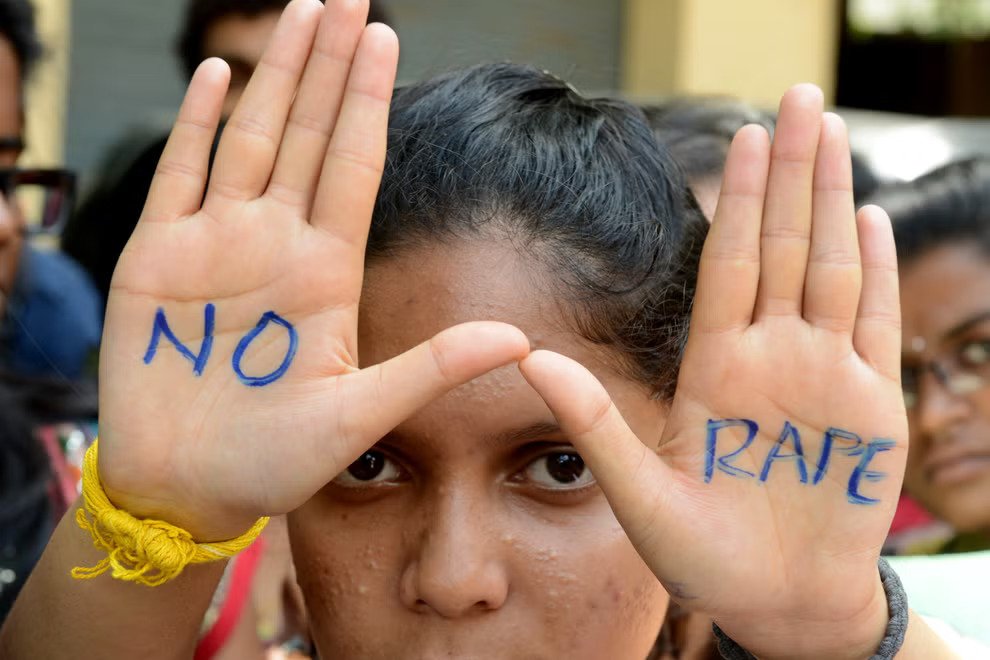Undermining statutory rape protection in Sri Lanka
Kumudini Samuel and Chulani Kodikara
On 9th February, the government gazetted a Bill to amend Sections 363 and 364 of the Penal Code (Chapter 19) which deals with statutory rape. According to these sections, sexual intercourse with a girl under the age of 16, with or without her consent, amounts to rape. An amendment to the Penal Code in 1995 (Act No 22 of 1995) raised the age of consent from 12 to 16 years.[1] The Penal Code reforms of 1995 also enhanced the sentence for statutory rape from 2 years to 10 years.
The new bill is proposing several amendments to these sections. Firstly, it seeks to mitigate the sentence against an offender who is 22 years of age or under at the time of the commission of such offence, in respect of a victim of or above 14 years but under 16 years of age. In such cases, where it appears to the satisfaction of the court that there was an intimate relationship between the offender and the victim, the court, upon conviction, may impose a sentence of imprisonment for a term of less than ten years (even without evidence to prove that sexual penetration had been with the consent of the victim). Secondly, in addition to an intimate relationship, if there is evidence that sexual penetration had been with the consent of the victim, the court has been granted the power to suspend the sentence. The offence of statutory rape has also now been made gender-neutral.
The inclusion of young boys in the offence of statutory rape is welcome, but otherwise, this is a highly regressive amendment. It effectively lowers the age of consent for sexual intercourse with a girl or boy from 16 to 14 for the benefit of young men. It runs counter to the 1995 Penal Code amendments and undermines years of women’s activism around rape in Sri Lanka. Why this urgency to amend this law at this moment in time?
The argument for introducing factors that mitigate the punishment of young men guilty of statutory rape is that adolescents are now more sexually active and, therefore, should not be penalised by the law. We recognise that the concept of statutory rape illuminates a tension within feminist activism relating to protecting a young person’s right to freedom and choice relating to sexual autonomy, and their right to security and protection from sexual abuse and exploitation. However, these amendments seem to suggest that there can be no rape when there is an intimate relationship. Feminist activists and scholars have long argued for the need to establish proactive consent to address sexual violence effectively. i.e., consent must be voluntary, affirmative, unambiguous, and contemporaneous to the initiation of every sexual act. Moreover, every person, irrespective of age, should have the right to revoke consent at any time. This means that consent cannot be presumed because of a prior romantic or intimate relationship. There is always the right to say ‘no’ (Gerberg & Dunn 2014).
The overwhelming motivating factor for the present amendment is the desire to ‘protect’ young men from punishment for statutory rape that is considered too ‘harsh’. It is motivated by a discourse among certain public sector officials, including police officers and ministry officials, that has been prevalent for some time that the statutory rape law has the potential to ‘blight’ the futures of bright young men and boys – our future doctors, lawyers, academics, and so on, for having consensual sex with young girls. However, this is far from the reality that we occupy.
Rape, including statutory rape, is an offence committed with almost complete impunity in Sri Lanka. The number of rape and statutory rape complaints documented by Women and Children’s Desks at police stations has been steadily increasing over the years. Nevertheless, only a few rape complaints lead to convictions. In 2022, there were 1391 complaints of statutory rape and four convictions. Moreover, only 30 plaints were filed by the police concerning a total of 256 reported cases of rape or incest. There was one conviction. Most cases are pending investigation or pending in the Magistrate’s Court, High Court, or Attorney-General’s Department (SL Police 2022). So, few men’s futures are likely to be ‘blighted’ by rape laws in Sri Lanka. What about the need to protect young girls and boys from violent sexual activity that would blight their life chances and futures?
In this rapid and brief intervention, we trace the feminist rationale behind statutory rape and emphasise that what is necessary is to address the question of impunity for rape, including statutory rape in Sri Lanka.
Consent and statutory rape
According to Sri Lanka’s Penal Code, a man commits rape when he has sexual intercourse with a woman without her consent. Penetration is necessary to establish the offence of rape. However, other forms of sexual violence against women are covered under the crime of “grave sexual abuse” including sexual violence against men and boys. The question of consent is pivotal to the offence of rape and sexual abuse. The UN Special Rapporteur on Violence against Women, its Causes and Consequences in a model law criminalising rape, defines consent in relation to rape as follows:
Consent must be given voluntarily and must be genuine and result from the person’s free will, assessed in the context of the surrounding circumstances, and can be withdrawn at any moment. While consent need not be explicit in all cases, it cannot be inferred from: (a) silence by the victim; (b) non-resistance, verbal or physical, by the victim; (c) the victim’s past sexual behavior; or (d) the victim’s status, occupation, or relationship to the accused. (UN Special Rapporteur on Violence Against Women, 2021: 7)
The Special Rapporteur’s report has additional detail on circumstances in which there is likely to be a lack of consent and persons incapable of giving consent. However, consent is irrelevant to the offence of statutory rape. Under statutory rape laws, it is not necessary to prove the use of force to violate the law because these laws are premised on the notion that adolescent girls under the age of consent are not mature enough to make informed decisions and offer genuine consent. The offence of statutory rape historically was intended to protect young girls— without adequate agency and power to say no, and from being coerced into non-marital sexual intercourse. The draft amendment extends this protection to young boys.
A significant concern underlying statutory rape law relates to the question of power, particularly power differences arising out of age differences between the offender and the victim-survivor, and how such power and authority can be used to pursue a sexual relationship. Allowing the courts to mitigate or suspend punishment for statutory rape in the case of young girls and boys between the ages of 14 and 16, where the offender is 22 years old or below, amounts to legally sanctioning sexual abuse and exploitation in unequal situations of power.
Yet another concern is the need to protect young girls from the unintended consequences of unprotected sex, which includes pregnancy, the physiological and psychosocial harm of early pregnancy, and sexually transmitted diseases. There is also the well-founded concern that such pregnancies would significantly curtail life opportunities for girls. In addition, entrenched discriminatory cultural practices still prevalent in Sri Lanka that equate sex with marriage for girls have also resulted in sexually active young girls being coerced into early cohabitation and enforced marriages at the age of majority.
These are some of the reasons why consent is irrelevant to the offence of statutory rape in many different contexts, including Sri Lanka, and these reasons continue to be valid. In Sri Lanka, additionally, entrenched bigoted barriers to providing age-appropriate comprehensive sexuality education for children and adolescents in schools further hamper the ability of young girls and boys to provide informed consent. In 2019, an attempt by the Ministry of Education and the Ministry of Health to introduce a Grade 7 sex education textbook (Hathe Ape Potha) was met with public outrage. Buddhist monks were at the forefront of this opposition on the grounds that such education was detrimental to cultural values (Dissanayake, 2023; Wickramasinghe, 2020).
It would make more sense if school children are allowed to learn about sex before they are allowed to have sex legally. It would make more sense if the mitigating factors apply only in the case of an offender who is a minor, i.e., below 18. There is a trend in some jurisdictions across the world to adopt exceptions to statutory rape laws known as ‘proximity in age’ or ‘Romeo and Juliet’ clauses /defences that uphold the illegality of consensual sex with a minor while providing for a lesser sentence if the age gap between offender and victim-survivor is minimal. The proposed amendments to the Penal Code may well be attempting to do this. However, it defies the ‘proximity in age’ defence or argument since it recognises intimacy between a girl/boy as young as 14 and a man up to 22 years of age.
An amendment long in the making
We are not entirely surprised to see this proposed amendment. This move has been in the offing for some time. In 2008, the Supreme Court (SC Ref 30/2008) upheld a judgment delivered by the Anuradhapura High Court in which the presiding judge declined to impose the mandatory minimum sentence for statutory rape citing mitigating circumstances. The Supreme Court held that the mandatory sentence imposed under Sec 364 (2) of the Penal Code conflicts with Articles 4 (C) 11 and 12 (1) of the Constitution; and that a High Court is not inhibited from imposing a sentence that it deems appropriate in the exercise of its judicial discretion. While admitting that a woman’s consent is immaterial for the offence of rape when she is under the age of 16 years, the Supreme Court nevertheless held that “a woman’s consent is relevant for a Court in the exercise of its discretion in deciding the sentence for such an offence”.
This decision has led to a spate of rape and statutory rape judgments imposing low sentences. It has resulted in suspended sentences perpetuating a sense of impunity in cases of sexual violence against girls and women. The non-governmental Lawyers for Human Rights and Development (LHRD), in a subsequent report, noted an alarming change in judicial attitude towards cases of sexual violence of women and children. Instead of exercising their judicial discretion and imposing a reasonable sentence in appropriate cases, High Courts, they observed, were imposing suspended sentences indiscriminately. Information collected by LHRD on 129 concluded sexual violence cases from 2009 and 2010 reveal that in 114 of the cases, the accused were given suspended sentences for rape, including statutory rape, with no mitigating circumstances whatsoever. LHRD subsequently filed a case before the Supreme Court asking for a review of the Supreme Court judgment of 2008. LHRD withdrew this following a guarantee from the then Chief Justice that sentencing policy would be inquired into and appropriate guidelines issued to High Court judges (LHRD 2012). This was never done.
Those who are motivated to protect young men found guilty of rape are now conveniently drawing on this existing jurisprudence to legally entrench this practice of suspended sentences for statutory rape and, more generally, rape.
Statutory rape is a serious crime. Child sexual abuse is rife in Sri Lanka. It manifests in different ways and in many varied circumstances, from incest to child porn to cyber sexual violence that is increasingly trapping teenage girls in crimes perpetrated by teenage boys and adult men. This is why the current amendments that seek to lower the age of consent for sex to 14, while not punishing men under the age of 22 found guilty of statutory rape is unacceptable. Moreover, the levels of impunity for both rape and statutory in Sri Lanka point to deep structural inequalities in holding men accountable for violence against women and girls. The government should withdraw this amendment immediately and urgently address the question of impunity for rape.
Kumudini Samuel is a Director at the Women and Media Collective, Sri Lanka. Chulani Kodikara is a Research Fellow at Queen’s University, Belfast. The authors thank Ramani Muttetuwegama for helpful comments on an earlier draft.
Image Source: https://bit.ly/3PgjMXz
References
Dissanayake, Methmalie. (2023). “Walking the Tightrope Between Sex Education and Culture” Ceylon Today, 20 May 2023, https://ceylontoday.lk/2023/05/20/walking-the-tightrope-between-sex-education-and-culture/
Gerberg, Rory and Laura Dunn. 2014. Comments To: White House Task Force to Protect Students from Sexual Violence. Defining Consent to Effectively Address Sexual Violence, https://scholar.harvard.edu/files/rorygerberg/files/WH_task_force_comments
_2014april.pdf
Lawyers for Human Rights and Development. (LHRD) (2012). Justice Suspended? A Study on Suspended Sentences for Sexual Offenders. Colombo: LHRD.
Sri Lanka Police. (2022). Grave Crime Abstract for Whole Island from 1.1. 2022 to 31.12.2022, https://www.police.lk/wp-content/uploads/2023/07/GRAVE-CRIME-ABSTRACT-FOR-WHOLE-ISLAND-FROM-01.01.2022-TO-31.12.2022.pdf
UN Special Rapporteur on Violence Against Women. (2021). A framework for legislation on rape (model rape law), Addendum, Doc. A/HRC/47/26/Add.1, https://documents.un.org/doc/undoc/gen/g21/149/63/pdf/g2114963.pdf?token=sMmJ9YwKRN7fWWbiNg&fe=true
Wickramasinghe, Kamanthi. (2020). “When Conservatism gets in the way of Sex Education: Comprehensive Sexuality Education in SL”, Daily Mirror. 3 January 2020, https://www.dailymirror.lk/News-Features/WHEN-CONSERVATISM-GETS-IN-THE-WAY-OF-SEX-EDUCATION-Comprehensive-Sexuality-Education-in-SL/352-180620
Notes
[1] The statutory rape provision does not apply to husbands of Muslim girls under 16 years who are legally married under Muslim law. In fact, as marital rape is not recognised in Sri Lanka, a husband cannot be found guilty of rape.
You May Also Like…
Plucking the Stars (நட்சத்திரங்களைப் பறித்தல்). Arulraj Ulaganathan. 2026.
B. Skanthakumar
Plucking the Stars (நட்சத்திரங்களைப் பறித்தல்) conjures memory from Arulraj Ulaganathan’s childhood on a tea...
Obeyesekere the Dreamer: Visionary Journeys in Anthropology
Anushka Kahandagamage
I remember vividly one pattern in my youthful dreams repeated time and again, without too much variation, that of...
Gananath Obeyesekere: The Anthropologist and the Historian
John D. Rogers
I first met Gananath at the Annual Conference of the Association for Asian Studies in Washington DC in March 1984,...




